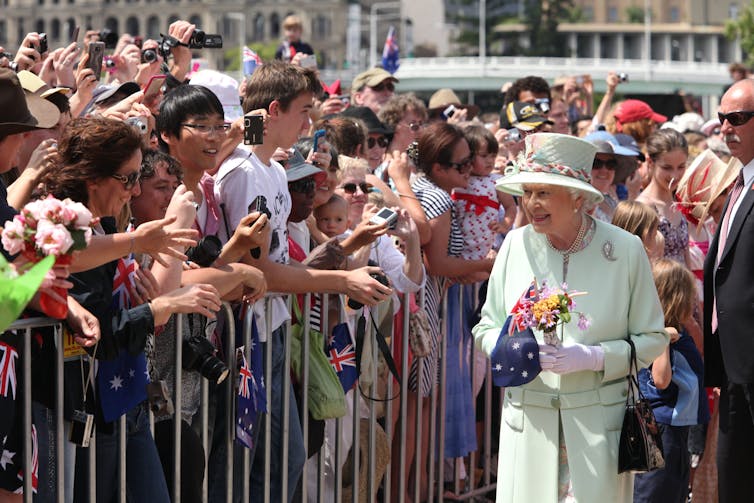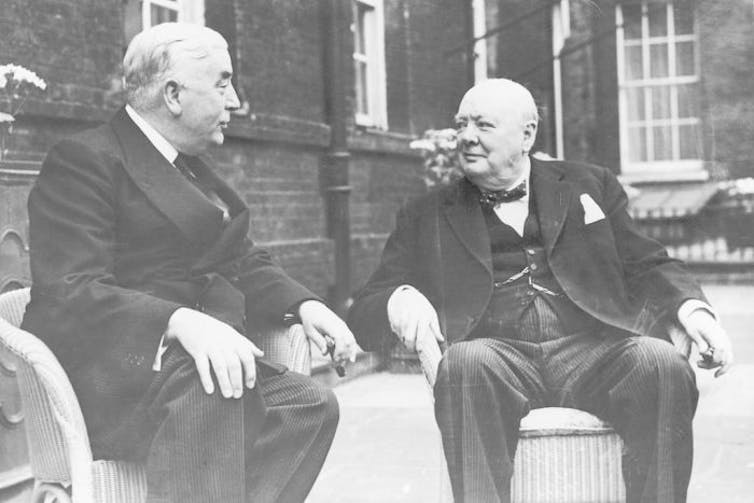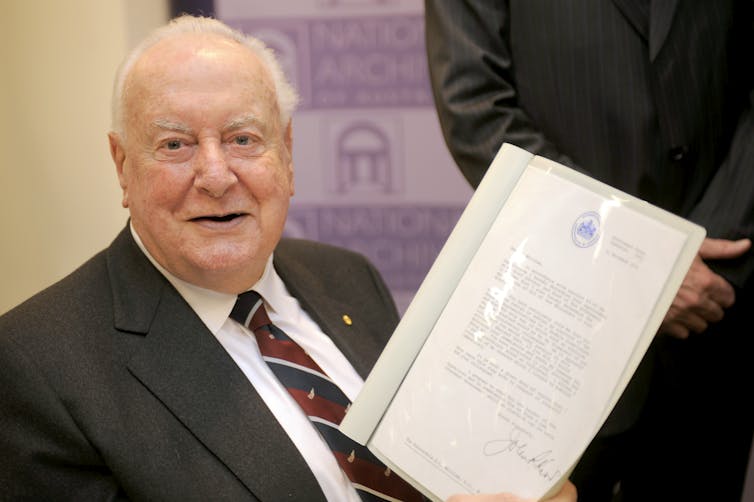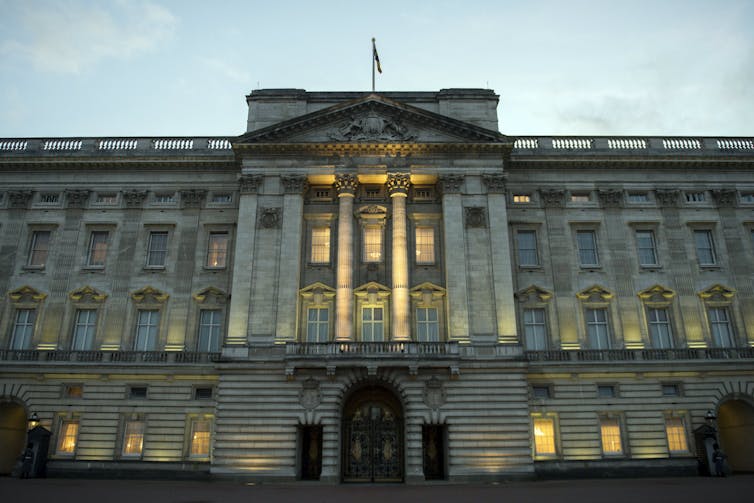Relics of colonialism: the Whitlam dismissal and the fight over the Palace letters
- Written by Jenny Hocking, Emeritus Professor, Monash University
This piece is republished with permission from Commonwealth Now, the 59th edition of Griffith Review. Articles are a little longer than most published on The Conversation, presenting an in-depth analysis on the relevance of the Commonwealth of Nations in today’s geopolitical landscape.
We will make better decisions on all the great issues of the day and for the century to come, if we better understand the past. – Gough Whitlam
The celebration of the “Queen’s birthday” in Australia is a perfect reflection of a fading, remnant, relationship. Commemorated in the Australian states as a public holiday on three different days – none of which is her birthday – and honouring an event of dubious significance, the “Queen’s birthday” reminds us that, despite our national independence, the symbolic ties of colonial deference remain.
The “Queen’s birthday” may seem a fitting if absurd genuflection to a powerless relic of a former time, and in itself confirmation that the Queen no longer has a role in post-dominion matters. But things are not always as they seem.
Neither sovereignty nor national independence flowed neatly from federation. The Commonwealth of Australia Constitution Act created Australia as a federation of the former colonies and a constitutional monarchy, with all the tension inherent in that term – between a democratic government chosen by the people and a monarchical head of state whose ultimate constitutional power stemmed solely from inherited aristocratic assumption and unchallenged legal privilege.
The gradual devolution of Australian autonomy appeared assured at the Imperial Conference of 1926. This affirmed the relationship between Great Britain and its dominions as being that of:
… autonomous communities within the British Empire, equal in status, in no way subordinate one to another in any aspect of their domestic or external affairs, though united by a common allegiance to the Crown.
The critical qualifier in this proclamation of an imperial gift of national autonomy, equality and independence is this: “though united by a common allegiance to the Crown”.
The imperial assertion of continued dominion allegiance to the Crown was a stark counterpoint to the proclaimed national autonomy. Indeed, it undermined the very autonomy and equality of nations the conference so proudly affirmed.
Five years after the Imperial Conference, the Statute of Westminster gave statutory expression to the principles of equality established at the Imperial Conference and vested full legislative authority and independence in the “dominions”.
Nevertheless, it remained the case that some bills would continue to require the Queen’s assent to be passed into law. The Statute of Westminster also granted dominion ministers the right of direct access to the sovereign. This access had previously been available only indirectly through UK ministers and reflected their then incomplete post-colonial status.
 The ‘Queen’s birthday’ is celebrated in Australia on three different days – none of which is her actual birthday.
AAP/Jodie Richter
The ‘Queen’s birthday’ is celebrated in Australia on three different days – none of which is her actual birthday.
AAP/Jodie Richter
A fight for independence
Yet, in reality, neither of these critical junctures in the evolving British–Australian relationship created the clear-cut path to national independence that these paternalistic statements of ceded imperial power might suggest.
Although the dominions were entitled to separate representation at the League of Nations and subsequently the United Nations, as made clear at the Imperial Conference, the cultural expectation of continued British primacy and Australian dominion subservience remained.
It can be seen in the British attitude toward the efforts of Australia’s minister for external affairs, H.V. Evatt, to champion the role of the smaller nations against the Great Powers at the San Francisco conference in 1945 that established the ground rules for the UN.
Evatt’s insistence that Australia would take its own independent position as an autonomous nation in these high-level international negotiations infuriated the British representatives at the fledgling discussions over the UN.
At a preliminary meeting of Commonwealth nations in London, British Prime Minister Winston Churchill had bemoaned Evatt’s defiant independent stance.
Describing the Commonwealth as “the third of the Great Powers”, Churchill argued that the Commonwealth could only maintain its influence by ensuring unity among members and speaking with one voice – and that one voice of course would be Britain’s, not Australia’s.
These expectations of British administrative, legal and political authority, based more in the established imperial mindset, behaviours and networks than an exercise of formal political control, remained powerful resistors to change throughout the 20th century.
The undercurrent of lasting imperial privilege and hierarchy proved to be a major obstacle in ending the complex web of residual colonial ties across legal, constitutional and political domains.
In particular, continued allegiance to the British Crown as the imperial condition of dominion nationhood was a political oxymoron. It cast an impossible constraint on the form of national autonomy, while Australian allegiance to the British Crown was superimposed on the representative model of parliamentary democracy.
The fundamental contradiction this established at the heart of the Australian polity remained largely dormant during the long years under the avowed Anglophile prime minister Sir Robert Menzies, until inevitably rupturing along the faultlines of divided allegiance – to the British Crown on the one hand and to Australian democratic governance on the other – with the 1972 election of the Whitlam Labor government.
 Australia’s continued allegiance to the British Crown above all else was a theme of the Menzies/Churchill years.
Keystone-France/Getty Images
Australia’s continued allegiance to the British Crown above all else was a theme of the Menzies/Churchill years.
Keystone-France/Getty Images
Whitlam tries to loosen the ties
Gough Whitlam came to office with a core policy agenda of ending the residual colonial ties between Australia and Britain.
Although largely seen as ceremonial and symbolic, these colonial links were to be immensely significant in the trajectory of the Whitlam government and its dismissal threeyears later.
Whitlam moved rapidly on some of these. He ended the British honours system and introduced Australian honours, introduced an Australian national anthem to replace God Save the Queen, changed the Queen’s title by removing arcane references to God and Empire, and, in 1974, removed the words “God save the Queen” from the official proclamation dissolving parliament.
Eighteen months after his second election victory in the double dissolution of May 1974, Whitlam was peremptorily removed from office by the Queen’s representative in Australia, Governor-General Sir John Kerr, without warning and despite Whitlam maintaining a clear majority in the House of Representatives at all times.
Concerns were immediately raised over the possible role of Buckingham Palace and British authorities in this unprecedented vice-regal action. The suspicion that the Queen knew more about Kerr’s intentions than has ever been publicly acknowledged has grown in recent years with the Queen’s embargo of her correspondence with Kerr at the time of Whitlam’s dismissal.
Of all the residual colonial ties, the one that Whitlam found particularly abhorrent, and was determined to sever, was the right of appeal from some state supreme courts to the Privy Council. In his view:
No people with an ounce of self-respect would allow decisions made by their own judges … to be overruled by judges sitting in another country.
Whitlam described this as an “absurd” and “ludicrous” situation. Yet his efforts to end remaining state Privy Council appeals were stymied at every point.
Whitlam’s attorney-general, Lionel Murphy, reported he had struck nothing but intransigence, non-co-operation and obstruction from the British authorities in the government’s moves to implement this core policy.
Returning from his first visit to England as prime minister in 1973, Whitlam was clearly frustrated by the UK’s reluctance to end colonial ties when he told reporters, more in hope than confidence:
We are a separate country from Britain. We are an entirely independent country.
A tense meeting with Edward Heath, the British Conservative prime minister, the following year saw little change. An exasperated Whitlam again declared that:
All these colonial relics are incompatible with the position of Australia as a separate, sovereign country.
When the Whitlam government was removed from office by Kerr, three years later, these state-based appeals to the Privy Council remained, unchanged.
 Gough Whitlam aimed to end the residual colonialties between Australia and Britain.
AAP/Alan Porritt
Gough Whitlam aimed to end the residual colonialties between Australia and Britain.
AAP/Alan Porritt
What we know about the Palace’s role
The archival records of the British Foreign and Commonwealth Office (FCO) covering these official visits are at once illuminating and disturbing. They show a troubling lack of respect for such a significant engagement with a senior member of a new Australian government.
Murphy’s visit was, after all, the first official visit by any of Whitlam’s cabinet to England. And yet, even before his arrival, the FCO files show that British authorities viewed Murphy, and indeed the Whitlam government itself, as a troublesome interloper whose presence they barely tolerated and whose policy concerns they did not share.
More than mere intransigence, or even simply a refusal to accept the legitimacy of the Whitlam government, these archival records disclose profound breaches of confidence, secrecy and even deception of Whitlam by the FCO, the British High Commission in Canberra, and the Queen’s private secretary Sir Martin Charteris. They show a partisan pattern of disrespect for and undermining of the new Labor government.
Most significantly, far from any equality of national status, “in no way subordinate one to another” professed at the Imperial Conference, these files reveal the FCO’s brazen presumption – “our right as the colonial power” – to deceive the prime minister, to liaise in secret with the conservative states and, ultimately, to intervene in Australian politics to prevent the government holding a half-Senate election to resolve a stalemate in the Senate over the passage of supply bills.
From October 16, 1975, opposition senators refused to vote on the government’s supply bills, which provided the annual funds for government expenditure. In the new political vernacular, supply was “blocked”.
Calling the half-Senate election, which was then due, had been Whitlam’s resolution to this unprecedented situation since the day supply was first blocked. The Labor caucus had voted unanimously in support of Whitlam calling the half-Senate election “at a time of his choosing”.
The FCO files document a rapid breakdown and reversion to imperial imbalance in the British-Australian administrative relationship that began with the election of the Whitlam government and ended with its dismissal. They reveal a deep suspicion of the new government that quickly led to secrecy, deception and to routine breaches of the highest levels of confidentiality by both the British prime minister’s office and the Palace throughout the terms of the Whitlam government.
Most alarming is that the FCO files also reveal overt British involvement in Australian politics in the weeks before the dismissal – specifically with the half-Senate election due at that time and which Whitlam was to call on November 11, 1975, to end the blocking of supply in the Senate.
Kerr’s papers in the National Archives of Australia provided the first glimpse of the Palace’s role in the dismissal.
Although there are some who continue to claim that the Palace was not involved, this has increasingly become more a matter of faith than fact. Revelations from Kerr’s papers, the Palace letters, and the FCO’s files have rendered that position untenable.
We now know that Charteris wrote to Kerr in October 1975 to discuss action the Palace would take if Whitlam became aware of Kerr’s plans to remove him from office and sought to recall him as governor-general. Charteris told Kerr that the Palace would, in that instance, “try to delay things”.
This communication between the Queen’s private secretary and the governor-general over the position of the governor-general himself is politically and constitutionally shocking. It reveals the Palace to be in deep intrigue with Kerr, to protect his tenure as governor-general, in the weeks before the dismissal – unknown to Whitlam.
It was also a breathtaking rupture of the vice-regal relationship. At the heart of this relationship in a constitutional monarchy is that the appointment of the governor-general is made by the Queen on the advice of the Australian prime minister alone. This has certainly been the case since 1930, when King George V accepted Labor prime minister James Scullin’s advice to appoint Sir Isaac Isaacs as governor-general.
Despite being vehemently opposed to Isaacs’ appointment, the King told Scullin:
… being a constitutional monarch I must, Mr Scullin, accept your advice.
For the Queen’s private secretary to intervene with Kerr himself on the question of the governor-general’s tenure was a staggering breach of that relationship.
From this point on, knowing that Kerr was considering dismissing Whitlam and concerned that Whitlam might then recall him, and having agreed to a course of action in order to protect Kerr’s position should Whitlam do so, the Palace was already involved in the dismissal.
 Buckingham Palace was in deep intrigue with Sir John Kerr in the weeks before he dismissed the Whitlam government.
EPA/Will Oliver
Buckingham Palace was in deep intrigue with Sir John Kerr in the weeks before he dismissed the Whitlam government.
EPA/Will Oliver
The fight over the Palace letters
The letters between Charteris and Kerr are part of the so-called “Palace letters”. This is the secret correspondence between the governor-general and the Queen, her private secretary, and Prince Charles, in the weeks before the dismissal.
Although these letters are among Kerr’s papers and held by the National Archives in Canberra, they are closed to us. This is because the Palace letters are considered “personal” and not official “Commonwealth” records. This is despite Kerr’s own description of them as his “duty” as governor-general, and despite their obvious significance to our history.
The Palace letters are embargoed until 2027, “at her Majesty the Queen’s instructions”, with the Queen’s private secretary retaining an indefinite veto over their release even after this date. It is quite possible, then, that they will never be released.
The Palace letters are extraordinarily significant historical documents. They are contemporaneous real-time communications between the Queen and her representative in Australia, written at a time of great political drama, and are a vital part of our national historical record.
At the heart of this still-secret vice-regal correspondence was the prospect of the dismissal of the Whitlam government, which Kerr had already raised in September 1975 with Prince Charles and Charteris.
The designation of the Queen’s correspondence with her representative in Australia as “personal” means they do not come under Australia’s Archives Act, which relates only to official “Commonwealth records”.
And so, in a rather neat catch-22, the decision by the National Archives to deny access to the correspondence cannot be appealed to the Administrative Appeals Tribunal.
There is only one way to challenge this decision: through a Federal Court action, which is a complex, expensive and onerous proposition. This is clearly an area in need of legislative reform to ensure a viable appeal process is in place for records described as “personal” in this way.
In an effort to secure the release of the Palace letters, I launched an action against the National Archives in the Federal Court last year, with a legal team working on a pro-bono basis and supported by a crowdfunding campaign. This concluded in September 2017; the decision is anticipated within months.
At the heart of the case is this central question of just what constitutes “personal” as opposed to “Commonwealth” records. Lead barrister Antony Whitlam (Gough Whitlam’s eldest son) argued to the court that “personal records” would be records covering matters “unrelated to the performance of Sir John’s official duties”, and that this could not extend to correspondence between the Queen and her representative in Australia prior to the dismissal. He said:
It cannot seriously be suggested that there was a personal relationship between the Queen and Sir John Kerr.
It is difficult to see, from common sense alone, that the correspondence between the Queen and her representative in Australia could in any way be seen as “personal”. The precise legal points on which the question of Palace letters’ status will turn – whether as personal or Commonwealth records – will be a different matter.
The case itself has brought to light a significant amount of new historical and contemporary material on the relationship between the Queen and the governor-general and its implications for Australian national sovereignty.
One thing that can be said is that from the moment this case came before the court, the question of the release of the Palace letters changed irrevocably. Their status and their release will now be determined by an Australian court, according to Australian law – and not as a quasi-imperial grant of release by the Queen.
This alone is an historic and important outcome that ends one of the few remaining “colonial relics” that continue to deny us access to historical documents relating to the Queen about a historical episode also relating to the Queen.
The continued embargo by the Queen of the Palace letters and the revelations from the British archives of the FCO all point to the lingering imperial power that comes from an incomplete severance of colonial ties. They show above all that the residues of colonialism, the “imperial aftermath” in Whitlam’s words, can never be fully extinguished until Australia becomes a fully independent republic.
It is surely absurd that in the 21st century we can still see the Australian prime minister giving an Australian knighthood to the Queen’s consort, Prince Philip, and that the governor-general, the Queen’s representative in Australia, can still dismiss an elected government on the basis of claimed “reserve powers” derived from, and in the name of, the Queen.
As an independent autonomous nation, Australia has a right to know its own history, including and in particular the records pointing to British involvement in that history, if we are to ensure such a profound rupture in our political structures and denial of our national sovereignty cannot happen again.
This troubling time in our history and in the Australian–British relationship is also critical to our decisions as we recommence the debate over the inevitable move toward a republic.
The fundamental issues to be confronted in that debate will relate absolutely to the events surrounding the dismissal of the Whitlam government: how to protect the institutions of democratic parliamentary governance, how to secure the formation of government in the House of Representatives, and what the powers of the new, Australian, head of state should be.
You can read other essays from Griffith Review’s latest edition here.
Authors: Jenny Hocking, Emeritus Professor, Monash University




